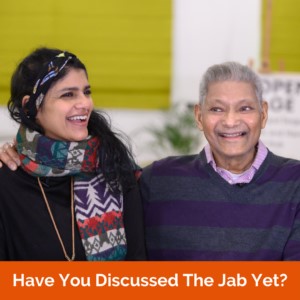Vaccines have been a hot topic on social media, particularly since the beginning of the COVID-19 pandemic. Facebook, Twitter, Instagram and others have been the source of viral hoaxes while young scientists have embraced social media to explain how vaccines work. For our part, Vaccines Today is active on Twitter, Facebook, LinkedIn and YouTube.
One of the good things about social media is that, unlike newspaper advertising, TV promotion or billboards, it is possible to see who is looking at your posts. This is a very useful way to move past stereotypes about who uses social media. The idea that social networks are the preserve of younger people is on the way out. It is now clear that people of all ages use social media and connect with one another online.

A new study by the International Longevity Centre UK (ILC-UK) has found that social media advertising can be a cost-effective way of engaging older people in deprived communities with vaccination.
David Sinclair, Director of ICL-UK, suggests the study shows that, in an era of life-course immunisation, social media promotion should play a bigger role in public health campaigns for people of all ages. ‘As far as we can tell, no research has ever tested the potential impact of using social media to deliver health messages across generations,’ he said. ‘The report seeks to test whether younger people can influence the health behaviours of older people.’
Targeted advertising
The researchers ran a large-scale targeted social media advertising campaign and studied data on its impact. The ads encouraged people to click to book an appointment for a vaccine against flu or pneumococcal disease. After reaching over a million people and generating more than 5 million impressions, the report concluded that this was an effective way of encouraging older people to get their vaccines.
For the pneumococcal vaccine, the campaigns had a particularly strong impact and cost less than one third of the price per click than flu adverts – most likely because many people had already received the flu vaccine, while the pneumococcal vaccine was relatively unknown, according to the authors.

Sophia Dimitriadis, a senior economist at ILC and lead researcher on the project, said further research is needed to understand what kind of social campaigns work best. ‘Social media often gets a bad rep, but we’ve shown that it has huge potential when it comes to immunisation – including for people living in deprived communities, who are typically hard to reach through the traditional healthcare system.’
The study shows there is ‘untapped potential’ waiting to be unlocked, she added: ‘Our campaigns generated more engagement and at a cheaper rate than the average healthcare industry advert. Social media should become part of our arsenal for promoting and protecting public health.’
As well as offering value for public health communication budgets, this approach may pay off in human and health terms, according to Amber Williamson, Founder & CEO of Digital Willow who worked on the project. ‘We have shown that it was over 60 times more cost-effective to run the campaign on social media than to cure someone with flu, or a whopping 133 – 453 times cheaper to prevent someone from getting pneumonia. We look forward to seeing more health campaigns communicated this way in the future.’
Dr Daphne Holt, Chair of the Coalition for Life Course Immunisation (CLCI) and a member of the Vaccines Today board, said the findings show that social media has the potential to transform uptake of the flu and pneumococcal vaccines. ‘Vaccination is an important health tool which should be used right throughout the life-course,’ she said. ‘While there are a number of recommended vaccinations for older people, uptake is still low in some communities.’
This research was supported by a grant from the Vaccine Confidence Fund as part of a $7 million investment from Facebook and Merck, aimed at boosting vaccination confidence through social media.



